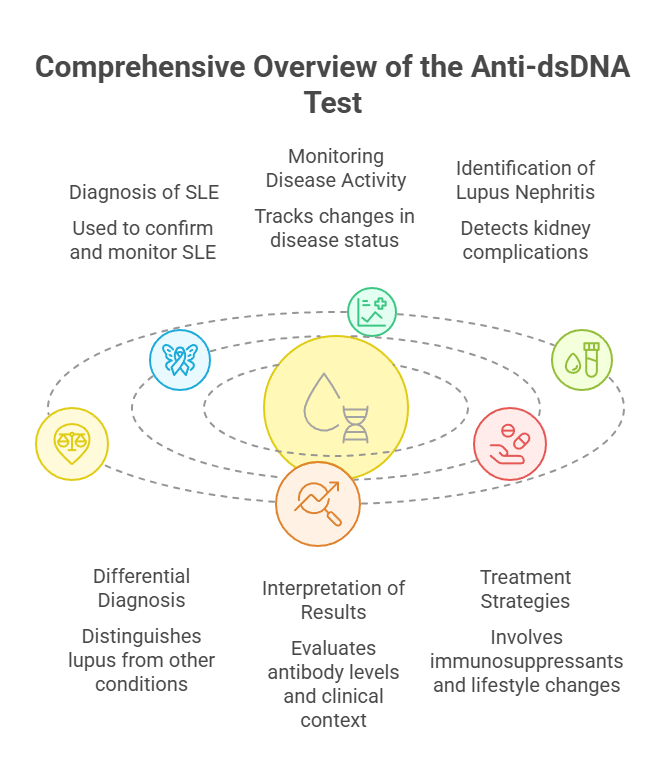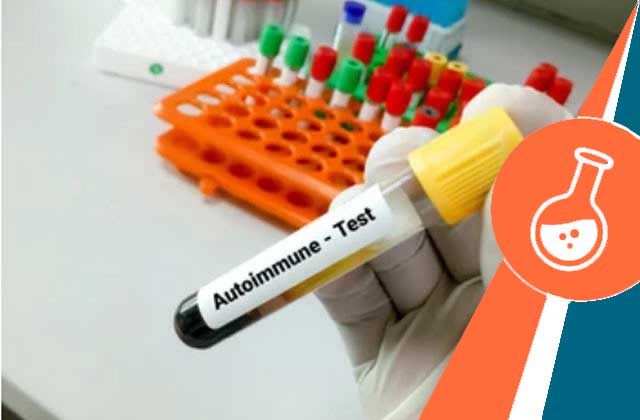
Anti-dsDNA and its Function
Anti-dsDNA, or anti-double-stranded DNA antibodies, are a type of autoantibodies that target and bind to double-stranded DNA (dsDNA) molecules. These antibodies are primarily associated with autoimmune disorders, particularly systemic lupus erythematosus (SLE), which is a chronic inflammatory disease that can affect multiple organs and tissues in the body.
Conditions that may require Anti-dsDNA Test
The anti-dsDNA test is primarily used as a diagnostic tool for systemic lupus erythematosus (SLE), as the presence of anti-dsDNA antibodies is strongly associated with this autoimmune condition. However, the test may also be ordered in other clinical scenarios to evaluate certain conditions or monitor disease activity. Some of these conditions include:
- Systemic Lupus Erythematosus (SLE): The anti-dsDNA test is most commonly used in the diagnosis and monitoring of SLE. Elevated levels of anti-dsDNA antibodies are found in approximately 60-70% of individuals with SLE and are considered a specific marker for the disease.
- Lupus Nephritis: Lupus nephritis is a kidney complication of SLE. The anti-dsDNA test may be ordered to assess the presence and activity of the disease in the kidneys, as higher levels of anti-dsDNA antibodies are associated with lupus nephritis.
- Monitoring Disease Activity: In individuals with known SLE, the anti-dsDNA test may be ordered periodically to assess disease activity. Fluctuations in anti-dsDNA antibody levels can provide insights into the progression of the disease and the effectiveness of treatment.
- Differential Diagnosis: The presence of anti-dsDNA antibodies, along with other clinical and laboratory findings, can help differentiate SLE from other autoimmune and inflammatory conditions. However, it is important to note that anti-dsDNA antibodies can also be detected in a small percentage of individuals with other autoimmune diseases or even in healthy individuals.
- Drug-Induced Lupus: Some medications can induce lupus-like symptoms in certain individuals. The anti-dsDNA test may be ordered to help distinguish between drug-induced lupus and idiopathic SLE.
- Prognostic Indicator: In SLE, higher levels of anti-dsDNA antibodies have been associated with more severe disease manifestations, such as kidney involvement and lupus nephritis. Therefore, the anti-dsDNA test may be used as a prognostic indicator to assess the risk of developing complications in individuals with SLE.
Anti-dsDNA Test Procedure
The Anti-dsDNA test is performed by drawing a blood sample from a vein in your arm. Our phlebotomist, will clean the site with an antiseptic and apply a tourniquet to make the veins more visible. He will then insert a sterile needle into a vein and collect the required amount of blood into a collection tube.
Interpreting Anti-dsDNA Test Results
The interpretation of anti-dsDNA test results requires consideration of several factors, including the specific laboratory method used, the reference range provided by the laboratory, and the individual’s clinical presentation. Here are some general guidelines for interpreting anti-dsDNA test results:
- Positive Result: A positive result indicates the presence of anti-dsDNA antibodies in the bloodstream. However, it does not necessarily confirm a diagnosis of systemic lupus erythematosus (SLE) or lupus nephritis. The interpretation of a positive result should be made in conjunction with the individual’s clinical symptoms, medical history, and other laboratory findings.
- Quantitative Results: Some anti-dsDNA tests provide quantitative results, indicating the level or titer of the antibodies. Higher levels of anti-dsDNA antibodies are often associated with a higher likelihood of SLE and an increased risk of lupus nephritis. However, the absolute level of anti-dsDNA antibodies alone does not correlate with disease severity or activity.
- Reference Range: Laboratories may provide a reference range or cutoff value to determine the positivity of the anti-dsDNA test. A result above the reference range is typically considered positive. However, the reference range may vary depending on the laboratory method used, so it’s essential to refer to the specific laboratory’s guidelines for interpretation.
- Trend Monitoring: Serial anti-dsDNA testing may be useful in monitoring disease activity and treatment response in individuals with known SLE. An increasing trend in anti-dsDNA antibody levels may indicate active disease, while decreasing or stable levels may suggest disease control.
- Clinical Correlation: It is crucial to interpret the anti-dsDNA test results in the context of the individual’s clinical presentation. SLE is a complex disease, and the presence or absence of anti-dsDNA antibodies alone does not definitively establish a diagnosis. The results should be evaluated alongside other clinical findings, such as symptoms, physical examination, and additional laboratory tests.
Treatment for High Anti-dsDNA levels
High levels of anti-dsDNA antibodies are often associated with autoimmune conditions, particularly systemic lupus erythematosus (SLE) and lupus nephritis. The treatment approach for high anti-dsDNA levels depends on the underlying condition and the individual’s specific clinical presentation. Here are some general treatment strategies that may be considered:
- Medications to Manage Autoimmune Response: Immunosuppressant medications are commonly used to control the autoimmune response and reduce the production of anti-dsDNA antibodies. Examples of immunosuppressants used in the treatment of SLE include corticosteroids (such as prednisone), immunosuppressive drugs (such as azathioprine, methotrexate, or mycophenolate mofetil), and biologic agents (such as rituximab or belimumab).
- Anti-inflammatory Medications: Nonsteroidal anti-inflammatory drugs (NSAIDs) may be prescribed to help manage symptoms such as joint pain, inflammation, and fever that can occur in SLE. In more severe cases, corticosteroids may be used to control inflammation.
- Treatment for Lupus Nephritis: If high anti-dsDNA levels are associated with lupus nephritis (kidney involvement), additional treatments specific to managing kidney disease may be necessary. This may involve higher doses of immunosuppressants, medications to control blood pressure, and potentially kidney-specific therapies such as angiotensin-converting enzyme inhibitors (ACE inhibitors) or angiotensin receptor blockers (ARBs).
- Lifestyle Modifications: Adopting a healthy lifestyle can support overall well-being and potentially help manage symptoms. This includes maintaining a balanced diet, engaging in regular physical activity, getting adequate rest, and managing stress.
- Regular Monitoring: Individuals with high anti-dsDNA levels will typically require regular follow-up visits with their healthcare provider to monitor disease activity, adjust medications if necessary, and assess organ involvement and potential complications.
More Related Tests
Why To Book with HealthCareOnTime

17 Crores+ Samples Processed

World Class Technology Labs

25+ Years of Trust & Experience

Free Home Collection
FAQs Around Anti-dsDNA Test
How much does Anti-dsDNA Test cost?
The Anti-dsDNA Test cost is Rs.980, although it is now available for Rs.720 because of the offer.










